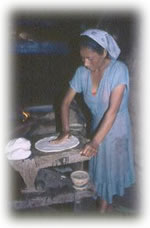 |
 |
||
 |
|||
|
RELATED THEMES family life social change OTHER LOCAL THEMES BACKGROUND |
gender
Most narrators describe, however, women and men commonly carrying out different types of activity. The narrators above give an impression of a parallel structure of official community positions for women: "I have held a lot of cargos in my village. In my community there's the Liga Feminil (Women's League) and I had the cargo of president and secretario (community secretary), and then.[health] promoter" (Mexico 4). Another women (Mexico 18) has clearly experienced this distinction: the community positions she has held in her (long) lifetime all relate to traditional women's activities: "I had three cargos. First the Liga Feminil and after that I worked in the DIF (Desarrollo Integral de la Familia, Integral Development of the Family) with Senora Susana. After that I worked with the milk here with Senora Refugia, I just had three cargos...". A narrator from Tiltepec (Mexico 19), when speaking of the division of outdoor work, notes that men cultivate the fields while women collect wild food: "Yes, the majority [who gather wild foods] are women and we get together to go, sometimes just three, four of us women get together and go to get tepejilote (small palm, Chamaedorea tepejilote, with edible fruit that resembles a small corn cob). I mean the men don't care about tepejilote because they are better off sowing their corn, weeding their coffee plantations, doing other work. So normally it's us women that go for tepejilote. The same with the mushrooms, there are more women than men in the places where the mushrooms are.I think that it's like a tradition of this village, the women are those that go for the tepejilote, go to get mushrooms and go to get guias (local name for edible leaves of young plants). [and] looking for firewood and all that, while the men are working [in the fields]". But when asked by the interviewer what is involved in collecting tepejilote, it is evident from her reply that it is not easy or pleasant work: ".you get a little bit of tepejilote for hundreds of cuts and bruises.yes, it's very nasty ...you can't find it in nice places, it's mostly between streams and outcrops of rock; I mean tepejilote likes rocky places." One narrator (Mexico 16) attacks "machismo" in community life, although she suggests that it is a thing of the past: ".there were. difficult situations because the men were still very attached to machismo.there were some that didn't value the help of a woman or didn't let her work or treated her with definite repression. Well, the men thought that the woman was something that he had bought and that he alone could order about, that she had to do what he said." She continues, referring to arranged marriages: ".the poor women in those days lived like that, being put down by their husbands because they had bought them like an object. She couldn't go to visit her parents when she decided but when her husband said so, and well, in that respect it wasn't good, was it?" The same narrator, however, concludes, in relation to arranged marriages, that ".now, as the times are changing, the priests explain things, they make us look at the things more carefully, one becomes more aware and this also helps the young people of our time, doesn't it?" She never married, and says: "I think that this is why God didn't call me to marriage - because I had something more to do. I haven't wanted for love because.I find love in the families with whom I live, with whom I get talking. If they explain a problem to me, well I help them in some way, talking to them, telling them [what to do] or seeing a way in which the man or the woman can be made [more] aware." quotes about gender"I finished primary school.but I didn't manage to study more as my parents were poor... People used to say you shouldn't send girls to school as they wouldn't end up with a cargo (unpaid community position), but it isn't like that now." "Yes, physically, the men are stronger but there was a time when they abused their strength in repressing women and imposing their will, but it's not the way it is, but the men took this right." "There were situations like this, even here in Ixtlán, that they married [their daughters] with people from other villages just because, according to them, they were fairly well off. But what happened? Those women suffered because they didn't even know the men, they didn't even know what the family was like and often. the woman arrived, well, to work as if she were a slave, a work machine. they had big families, and they weren't very well looked after either.[Men] didn't have respect for them. They didn't think that one has to look after a woman too because she has the same rights as the man. Unfortunately, because of the way of thinking in those days they treated them like that." "I got to be president of the Liga Feminil (Women's League), and. we started - they started - to build the chapel, and .I went to the houses to collect what little they could give to help continue with building the chapel. And now that I am alone - I have been alone for 17 years - I continue cooperating with the whole community, when they call me to help in the kitchen, [preparing food] for the people who will come." "No, just men, yes, just men [held cargos and took part in assembleas, community parliaments]. The women only held the cargos of committee, the Parents committee in the schools. That's what the women did, but the other cargos were just men; the women didn't take part in the assemblea [then]". "In those days it wasn't necessary to sow using a shovel, but just with one's feet, scattering the seeds quickly, and then [the women] covered the seeds with one foot and then the other and along they went, that's how they advanced quickly. There were some people who were very agile at sowing with just the foot and in this way the women also had work." |
|
 Of the 29 narrators from the Sierra Norte, 10 are women. Five of these gave their occupation as "housewife" and five another activity. One is a traditional doctor and health promotor; another took up flower cultivation when she was widowed. In their comments on daily life in the communities, the narrators describe a division of tasks between men and women that seem to be taken for granted. Men are still, it seems, accepted as the leaders of the community. One narrator, however, speaks of greater equality in the system of cargos (unpaid community positions):
Of the 29 narrators from the Sierra Norte, 10 are women. Five of these gave their occupation as "housewife" and five another activity. One is a traditional doctor and health promotor; another took up flower cultivation when she was widowed. In their comments on daily life in the communities, the narrators describe a division of tasks between men and women that seem to be taken for granted. Men are still, it seems, accepted as the leaders of the community. One narrator, however, speaks of greater equality in the system of cargos (unpaid community positions):